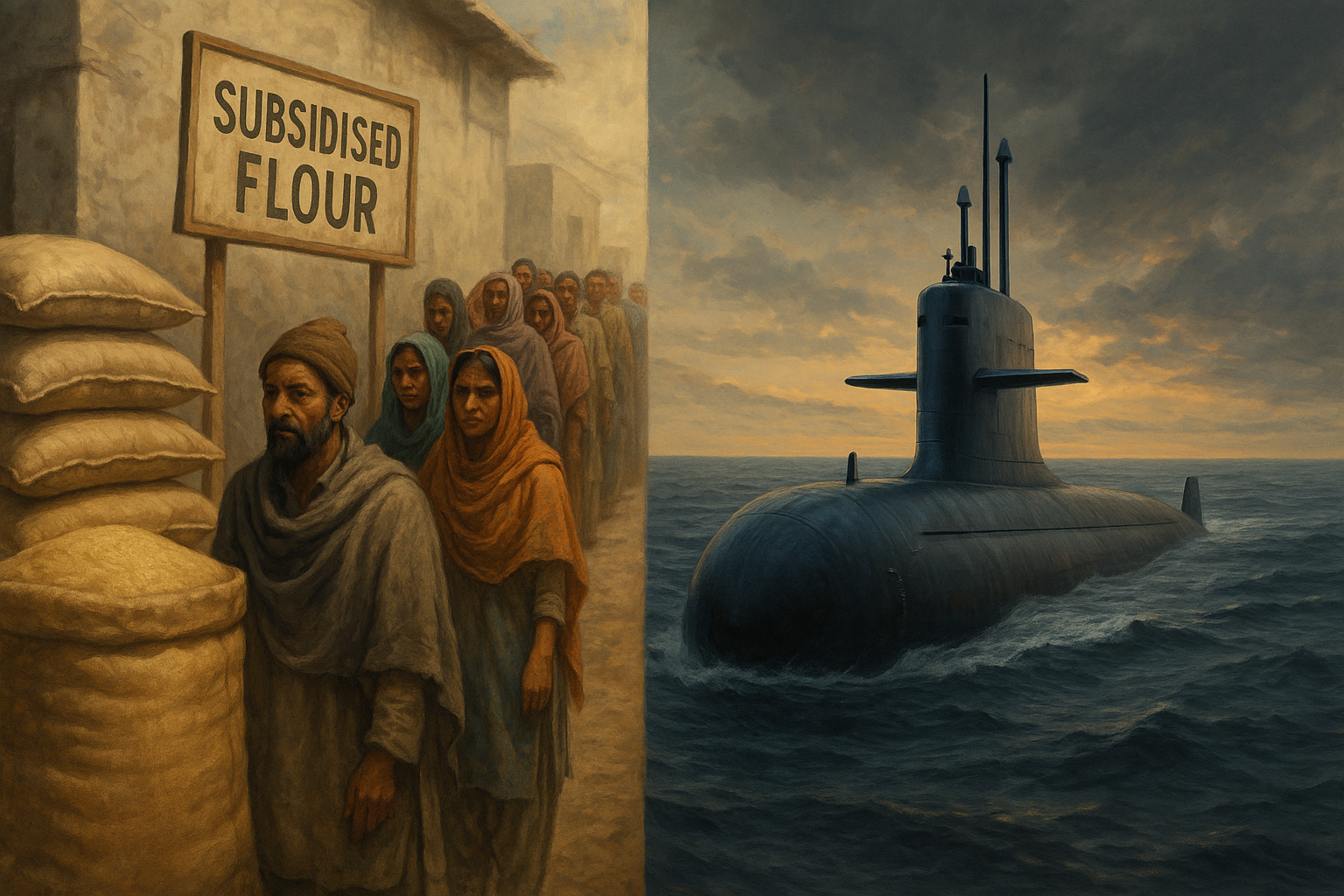Imagine a nation at a crucial juncture, faced with two sharply convergent choices. On one side lies the pursuit of military strength—a decision to invest USD 6 billion in a fleet of eight Hangor-class submarines. On the other side, however, there is the prospect of securing long-term food stability by using those same billions to guarantee wheat imports.
In this scenario, Pakistan opts for maritime power, committing vast national resources to advanced submarine technology instead of addressing persistent food insecurity.
This choice reflects Pakistan’s priority of symbolism over meeting the necessities of its population. The promise of strategic deterrence in turbulent waters takes precedence over the daily struggles faced by ordinary families waiting in queues for something as basic as flour. The implications stretch beyond mere numbers, raising urgent questions about national priorities, economic survival, and the lived experience of millions.
Pakistan’s annual wheat import requirement for the 2025–2026 season stands at around 1.0 million metric tonnes.
The global standard for wheat imports can fluctuate, but official reports confirm that, in recent years, the country’s annual wheat import bills have reached a staggering USD 1 billion due to persistent shortfalls in production and mounting pressure on domestic farmers to compete without government price support.
This dependency on imports is not simply a matter of policy miscalculation. It reflects deep structural inefficiencies, unpredictable climate events, and a growing population outpacing local harvests. Meanwhile, the Hangor submarine procurement represents Pakistan’s largest-ever naval acquisition, priced approximately at USD 6 billion.
When viewed through the lens of wheat import needs, these billions could fully fund grain purchases for the next twenty years, eliminating the annual scramble for emergency food supplies. Pakistan’s power centre needs to understand that the cost of submarines equals a generation of guaranteed wheat security.
The comparison grows even more urgent when one considers the plight of ordinary Pakistanis. The national flour subsidy programme, which plays a vital role in keeping bread affordable, costs about PKR 38 billion (roughly USD 130 million) per year. These subsidies keep families afloat—especially in urban centres like Lahore and Karachi, where inflation and unemployment force thousands to line up in the sun for bags of subsidised flour.
Yet the Hangor project, at six billion dollars, is nearly forty-six times greater than the annual flour subsidy expenditure. That is the price of food relief for tens of millions of households every single year, turned into a fleet of submarines built in foreign shipyards.
On the ground, the human story is instantly visible. Every day, common men and women spend hours waiting in flour queues, wrestling not only with hunger but also with the uncertainty of whether their basic needs will be met. The comparison could not be more painful: each rupee diverted to maintaining and operating a foreign-built submarine is a rupee not spent on food, education, or healthcare. Submarines may enhance strategic deterrence, but they do nothing for the empty plates of ordinary Pakistani kitchens.
International lenders such as the IMF are pushing hard for market reforms and the elimination of subsidies, intensifying the need to prioritise policy choices. The huge money earmarked for defence hardware could, instead, be redirected to ensure food security, stabilise wheat markets, and dramatically reduce the burden on families. The IMF, in its paper on Pakistan’s economic issues published in October 2024, stated, “Pakistan’s economy and living standards have lagged behind its regional peers for well over a decade.”
For families to have food on the table, national priorities must favour food, dignity, and collective well-being over military purchases, which act merely as symbols and have no real need for Pakistan.


Fantastic read! 👏 I really appreciate how clearly you explained the topic—your writing not only shows expertise but also makes the subject approachable for a wide audience. It’s rare to come across content that feels both insightful and practical at the same time. At explodingbrands.de we run a growing directory site in Germany that features businesses from many different categories. That’s why I truly value articles like yours, because they highlight how knowledge and visibility can create stronger connections between people, services, and opportunities.Keep up the great work—I’ll definitely be checking back for more of your insights! 🚀